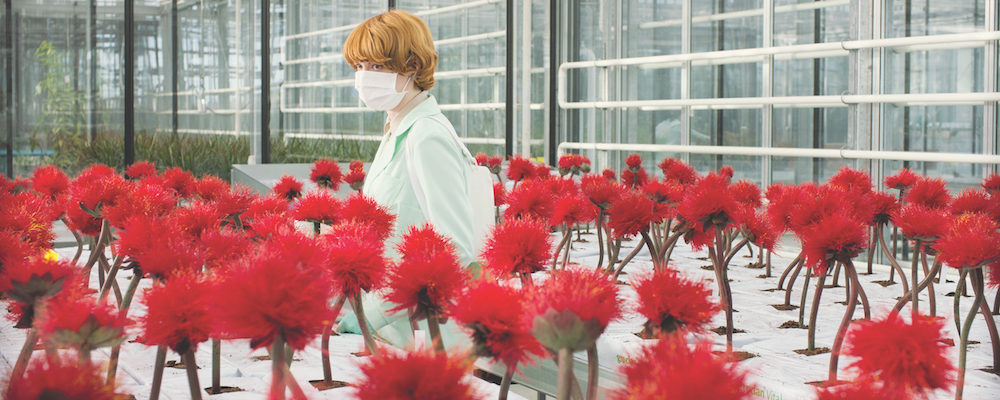Genetically Altered Plant Infects Humans in Muddled Indie Horror ‘Little Joe’
Sandra Miska
A genetically modified plant is at the center of “Little Joe,” the first English-language feature from Austrian filmmaker Jessica Hausner. This quiet indie horror stars Emily Beecham as Alice Woodard, a plant breeder who works at a London-based company called Planthouse Biotechnologies. There, she develops a strain of pretty flowers designed to make anyone who sniffs them happy. However, she only has so long to be proud of her accomplishment before strange things start to happen to those who inhale the plants’ pollen, including the person most important in the world to Alice, her tween son, Joe (Kit Connor), the namesake of her creation.
Animal lovers beware, a dog is the first “victim” of Little Joe, Bello, a lovable little pooch who belongs to Alice’s coworker Bella (Kerry Fox). Bello starts acting odd after breaking into the greenhouse, barking at his owner as if he she were a stranger. Bella is convinced that he is no longer her dog, but Alice and the others fail to take her claims too seriously, as she previously had to take a leave of absence from work due to mental illness. Eventually, Bella gets “infected” by the plant as well, as does Chris (Ben Whishaw), Alice’s love interest. To the outsider, there’s nothing out of the ordinary about them, but to Alice and others that know them, they’re pale versions of their former selves, hyper-focused on work, almost drone-like.
Beecham gives an understated performance as Alice slowly comes to grips with what Little Joe is capable of. It doesn’t truly hit home for her until she sees what the plant has done to Joe. In the beginning, he is attached to his mother, preferring her to her ex-husband, but their relationship takes a turn after she breaks protocol and brings the plant home. He soon becomes indifferent to his mom, talking of living with his father and spending more time with his new girlfriend, Selma (Jessie Mae Alonzo). This might be the most intriguing part of “Little Joe,” the exploration of the mother-son relationship. As they grow older, sons tend to pull away from their mothers, usually more so than daughters. While Joe’s behavior is an extreme example of this, as he seems to change overnight and some of his actions seem almost sinister, it’s not unlike what many young people go through as they approach adolescence and becomes almost strangers to their parents, at least for a period.
Hausner is obviously trying to draw parallels here between Little Joe and Planthouse Biotechnologies with antidepressants and big pharma, but she fails to go deep enough. It’s safe to call the film anti-psychology altogether, as Alice’s therapist (Lindsay Duncan) does little to help her, and at the end of one session we see her making harsh, detached observations about her patient into a tape recorder, implying that she is little more than a subject to her, not a person she truly cares about helping.
We never really get a full explanation for why Little Joe is the way Little Joe is, although Alice tries. However, there’s some speculation that because she made the plant sterile, as it would be irresponsible to make it possible for a lab-created organism to reproduce in the wild, it’s compensating for this by infecting humans. In the end, “Little Joe” falls short as both a horror film and a social commentary, although Beecham gives it her all. Another drawback of the film is that Whishaw, an actor who has long flown under the radar but recently won an Emmy, is grossly underused.
“Little Joe” opens Dec. 6 in select theaters.

